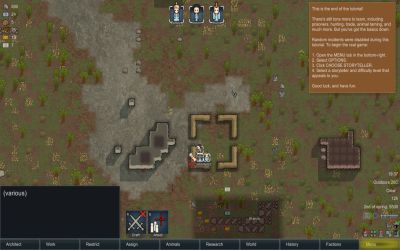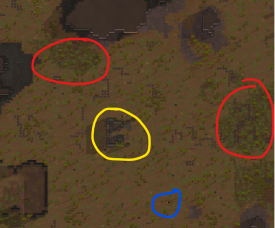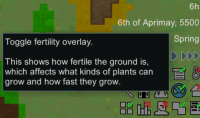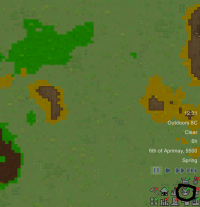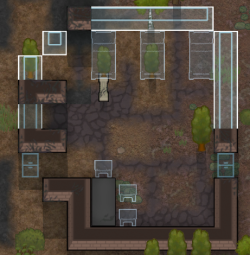Difference between revisions of "User:Hordes/Basics"
m (Zesty moved page User:Pedophile/Basics to User:Hordes/Basics without leaving a redirect) |
|||
| Line 26: | Line 26: | ||
The Crashlanded scenario starts with three colonists. You can randomize them as much as you want, but can't fully customized by the player without mods or dev tools. RimWorld is designed around a motely crew - you will not start with perfect colonists, nor should you try. But there are a few aspects worth taking into consideration. | The Crashlanded scenario starts with three colonists. You can randomize them as much as you want, but can't fully customized by the player without mods or dev tools. RimWorld is designed around a motely crew - you will not start with perfect colonists, nor should you try. But there are a few aspects worth taking into consideration. | ||
| + | [[File:Basics colonist example.png|thumb|right|600px|Example colonist selection.<br>'''Skills''': Great at Mining and Plants, amazing at Social. <br>'''Traits:''' [[Undergrounder]] means that they like staying indoors. Harmful if growing crops outdoors, but not a dealbreaker. [[Fast walker]] is an all-round good trait. <br>'''Health:''' Nothing bad right now, though fairly old. They may get detrimental conditions as they age.<br>Again, something to keep note of, but not important right now.]] | ||
:'''Skills''':<br> | :'''Skills''':<br> | ||
Skills and ''passions'' in a skill are both important to colony wellbeing. | Skills and ''passions'' in a skill are both important to colony wellbeing. | ||
Revision as of 20:36, 28 January 2023
|
This is the guide covering the gameplay Basics of RimWorld in detail. If you want a quick guide to the game, check out the Quickstart Guides.
- If you haven't already, play the Tutorial first. The tutorial will guide you through the RimWorld UI, help them set up a starter base, and defend against your first raid. Once you've completed the tutorial, you can set your storyteller and continue the game.
This guide is intended for players that are using the original Crashlanded scenario, and without any of the DLC enabled. If you're playing with DLC, then things will remain roughly the same. For the Ideology DLC in particular, you'll want to use the "Ideology system inactive" option.
Brand new players are encouraged to start with the tutorial, use the storyteller settings below, and leave the Learning helper on.
Colony Setup
UPDATE PICTURES
- Scenario: Pick the standard Crashlanded scenario. This starts you off with 3 colonists, some decent weapons, and Electricity. Most tutorials / information are geared towards this scenario.
- Storyteller: Select Cassandra Classic or Phoebe Chillax on any desired difficulty. The game's suggestions are fairly accurate; if you have trouble picking, then Adventure Story is a good start.
- Colony site: This consists of multiple factors.
- Biome: Pick Temperature Forest for now. It's not too hot, not too cold, has plenty of wood, wildlife, and buildable land, but less disease than a rainforest.
- Climate: You'll want a "year-round" growing period. This (almost) removes the pressures of winter.
- Terrain: Flat, Small Hills, or Large Hills will do. It doesn't really matter. The larger the hills, the more ores you'll have, but the less open space for building. Larger hills can also be used for natural defense.
Colonists
The Crashlanded scenario starts with three colonists. You can randomize them as much as you want, but can't fully customized by the player without mods or dev tools. RimWorld is designed around a motely crew - you will not start with perfect colonists, nor should you try. But there are a few aspects worth taking into consideration.
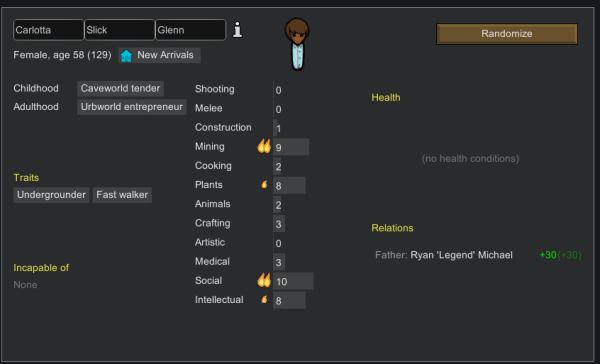
Skills: Great at Mining and Plants, amazing at Social.
Traits: Undergrounder means that they like staying indoors. Harmful if growing crops outdoors, but not a dealbreaker. Fast walker is an all-round good trait.
Health: Nothing bad right now, though fairly old. They may get detrimental conditions as they age.
Again, something to keep note of, but not important right now.
- Skills:
Skills and passions in a skill are both important to colony wellbeing.
The most important skills for survival are Shooting, Construction, Plants, and Medical. Any 1 colony should have a colonist with both a minimum of 5 skill points and 1 "flame" of passion each skill. The other skills are useful - each skill will be covered in detail below.
- Shooting - Defense against raiders and other threats to your colony. Also helps with hunting. Increasing shooting skill increases accuracy, especially at long ranges.
- Melee - Defense against enemies up close. In RimWorld, you cannot fire any ranged weapon once a colonist is in melee range (directly adjacent to an enemy). Increasing melee skill will increase the chance to hit and dodge in... melee.
- Construction - Creating structures, like walls, tables, and beds. A minimum construction (4-6) is required to build spike traps and electrical equipment. Increasing construction skill will increase speed, the quality of furniture, and reduce the chance of construction failure ("botched" construction).
- Mining - Breaking rock and harvesting ore. Increasing mining skill will increase mining speed and ore yield.
- Cooking - Creating meals from raw food. Increasing cooking skill will increase cooking speed and decrease the food poisoning chance.
- Plants - Growing crops to eat and sell. Plants 8 lets you grow healroot, a source of medicine, right away. Increasing plants skill will increase planting speed and harvest yield.
- Animals - Taming and training animals. Many animals have a minimum skill to train them. Increasing animals skill will increase the chance of animal tame/train success. Also reduces the manhunter chance when hunting.
- Crafting - Smithing armor and weapons, and tailoring apparel. Higher crafting skill will increase quality of crafted items. Does not increase the speed of crafting.
Note that the work types in the "Craft" tab, such as stonecutting, smelting, and drug synthesis, do not use the crafting skill. Stonecutting is unrelated to any skill and can be done by any colonist capable of Skilled Labor. - Artistic - Creating sculptures. One of the least important skills, at least at the start. Increasing art skill will quality of sculptures, but not their speed.
- Medical - Tending to injured and sick colonists. Increasing medical skill will increase tend quality, making injuries heal faster and diseases less deadly. Also increases success for surgery.
- Social - Trade, recruitment, etc. Increasing social skill will improve trade prices (both buy and sell) and make prisoners easier to recruit. Higher social also increases the impact of daily chats your colonists will have.
- Intellectual - Research and drug synthesis. Increasing intellectual skill will make research faster, as well as drug production.
Of these skills, Animals and Artistic are easily the least important to start with. Crafting isn't needed for immediate survival, but can be very handy later on. That leaves 9 skills that are important to be at least competent at (4+ skill). Thankfully, the "Team Skills" area at the bottom shows every important skill, except Social.
- You can forgo melee for the entire game. However, melee can be very helpful, and one of your 3 weapons will be a knife, a melee weapon.
- Cooking can be ignored if you plan to use a nutrient paste dispenser.
Don't worry too much about starting skill levels, as characters will get more skilled with time (they are not fixed values) when they do relevant work. And other colonists will be joining soon! Being good in a few important skills and competent in others is all you need for now.
- Traits:
Some traits can be very bad...
- Pyromaniacs are liable to cause a fire starting spree at any time. This can be an issue if they're around especially flammable objects.
- Chemical interest and chemical fascination pawns will ignore the player's drug policy in order to get their fix. However, they no longer go on random drug binges.
- Depressive and Volatile pawns are more vulnerable to mental breaks. During a mental break, a pawn won't do work, and may cause damage to their surroundings or others.
Others can be very good...
- Industrious is +35% work speed, forever, for almost any task. Industrious (and hard worker) are one of the few ways to increase the speed of unskilled tasks, like stonecutting.
- Tough is 50% damage taken, for all damage. This is effectively x2 health forever. No longer will a short bow instantly kill your colonists. Great for both melee AND ranged fighters.
- Bloodlust gets an immense mood boost for witnessing a kill, and another one for doing the killing. They also don't mind war crimes. More likely to start social fights, however.
Others can be in the middle.
- Very Neurotic is essentially Industrious and Volatile at the same time. Stacks with both Industrious and Volatile. Neurotic is a less intense version, as the name suggests.
- Brawler improves many aspects of melee combat. However, a brawler hates ranged weapons. A brawler is more upset with holding a ranged weapon than having both of their parents die.
The main takeaway is that very bad traits are very bad and should generally be avoided, but you don't need very good traits in order to have a successful colony. If you have a pawn with a great set of traits, keep them. If a pawn has good and bad traits, then they can still be worth it.
- Health conditions:
- Watch out for addictions. Ambrosia addiction is tolerable, but a beer addict will end up going through a painful withdrawal.
- A colonist with a chronic condition like asthma, artery blockage, or frail will be much worse off. Some can be cured with artificial body parts, others like frail require luciferium or one of few other solutions.
- For similar reasons, try to avoid colonists with peg legs or wooden hands. A peg leg equates to 80% movement speed until replaced, which is not something you want.
A health condition can be tolerated if a colonist is great in other fields. For example, an Industrious Crafter + Researcher is still worth taking despite a peg leg; a researcher won't need to move often, anyways. Otherwise, try to avoid any negative condition as much as possible.
- Work (in)capabilities:
- Colonists who are incapable of violence will not be able to fight incoming threats.
- Colonists who are incapable of dumb labor cannot haul or clean, which are especially important early-game jobs.
- Colonists who are incapable of firefighting will not be able to extinguish fires, which
At a bare minimum, you'll want 2 colonists capable of any work task. Being capable and being good are 2 separate things. But a colonist can't be any more skilled at Hauling, for instance.
TO DO
DELETE LATER
A. Base planning - Before you unpause
- 1. Weapons (possibly armor too?)
- 2. Where to set up
- 3. Stockpile zones
B. Colony planning - Essentials (Food, Shelter, Security)
- 5. Base building
- 6. Growing Zones + plant info
C. Technical details
- 7. Work + work priorities
- 8. Schedule
D. After the first day
- 9. Research
- 10. Combat
The Very Beginning
Weapons
You start with 3 weapons:
 Bolt-action rifle - A gun with amazing range. Of all the weapons in RimWorld, it has the second best range - only beaten by the sniper rifle. However, it isn't much stronger than a pistol up close. Because Shooting skill is more important when shooting from far away, have the colonist best at Shooting wield the bolt-action rifle.
Bolt-action rifle - A gun with amazing range. Of all the weapons in RimWorld, it has the second best range - only beaten by the sniper rifle. However, it isn't much stronger than a pistol up close. Because Shooting skill is more important when shooting from far away, have the colonist best at Shooting wield the bolt-action rifle. Plasteel knife - A melee weapon. Knives are one of the weakest melee weapons, but it is made of plasteel, the strongest material in the game. The plasteel knife is roughly equivalent to a steel longsword or mace of normal quality. Have your best melee fighter wield the knife, unless they're also your best shooter.
Plasteel knife - A melee weapon. Knives are one of the weakest melee weapons, but it is made of plasteel, the strongest material in the game. The plasteel knife is roughly equivalent to a steel longsword or mace of normal quality. Have your best melee fighter wield the knife, unless they're also your best shooter. Revolver - A pistol, good up close. Better than the bolt-action at close range, though most other firearms are stronger. Remember that you can't fire any ranged weapon in melee Have your remaining colonist wield the revolver.
Revolver - A pistol, good up close. Better than the bolt-action at close range, though most other firearms are stronger. Remember that you can't fire any ranged weapon in melee Have your remaining colonist wield the revolver.
To summarize: best shooter should get the rifle, then best melee gets the knife, and then the other colonist (if capable of violence) gets the pistol. The tutorial forces you to pick weapons without being able to pick your character bios. After you've finished the tutorial, just re-equip them in the desired order
You don't have to worry about enemies just yet, since Cassandra gives you a few days to prepare. Enemies shouldn't arrive until you get the "Need Defenses" pop-up on the bottom-right. But since your colonists start near their weapons, you might as well pick them up, right?
Unpause the game, have your colonists equip their gear, and re-pause. There's still things to set up.
Base location
In the tutorial, players are taught to build their first home at the map's center to hasten the lecture. This makes sense, as it's where your colonists start off at.
When creating your base, there are a few things to consider, in rough order of importance:
- Location - somewhat near the center of the map
- Near rich soil
- Nearby steam geysers
- (OPTIONAL) Natural defenses and structures
In the picture to the right:
- Not pictured: near the center of the map
- Red: Nearby rich soil
- Blue: Steam geysers somewhat nearby
- Black: Natural structures to build in
- Location
A central location will be further away from raiders. If you build near the edge on the map, then some raiders can spawn right next to you. No matter how big your walls are, some types of raiders will explicitly breach through them.
- Rich Soil
Rich soil increases plant growth speed by 140%. Rich soil is an irreplicable advantage until you can rely entirely on hydroponics. Even then, certain crops like corn and devilstrand cannot grow in hydroponics.
Rich soil is a darker shade of soil. In order to see the soil more easily, you can use the fertility overlay, in the bottom right corner of the screen.
Notes
- Assuming a year-round growing cycle, planting a crop in rich soil means you get 140% the yield, but need to harvest 140% more often (i.e. 140% more work). For the purposes of work, planting in 14 tiles of regular soil is almost exactly equal to 10 tiles of rich soil. However, faster growing has the advantage of stability. If your crops are destroyed by fire, then it will take 4 days instead of 5.5 days for it to regrow.
- Also, growing faster means the first batch of crops will be ready faster. Since you won't start off with much food, this is important. If your climate has a winter, then rich soil lets you grow more before the frost hits. Basically, rich soil is good to use, but not 100% necessary.
- Steam geysers
Steam geysers allow you to build geothermal generators on top of them. Geothermal is one of the best power sources of the game - it gives lots of power and it constantly gives power (unlike solar or wind. You don't need to be right next to steam vents. But you don't want to be too far away.
If you build a room on a steam geyser, then it will create lots of heat. This will overheat your colonists in a temperate biome, but if you're playing in a tundra, the heat of a steam geyser can help.
- Natural defenses
Throughout your map, hills and ruined structures will be placed sporadically. Consider using these structures to form the foundation of your base, at least for the first few days. IT saves having to build your own walls.
You can also use existing hills, rivers, marsh, etc. to your advantage, by slowing down enemy attackers.
Work
Colonists have some default work settings and will mostly busy themselves. Eventually, they run out of chores to do and begin to wander or idle. This is because there's a need for adjustments within their tasks. To improve their cooperation, open the Work tab at the bottom. Colonists will do assigned tasks from left to right. For further control, most players will activate "Manual priorities", by clicking the red cross at the top left of the tab.
- How priorities work
Jobs are checked from 1 to 4 (if manual priority is on), then from left to right. For the first job with an available task, a colonist will do every possible task related to that job. Then, they will do every possible task in the next column of work. For the most part, colonists do not care about efficiency; they'll do as they're told.
Let's take Bild as an example:
- Bild will first check for any possible task of Firefight. The "Firefight" task will only check for fires in the home area. If there are any fires in the home area, then Bild will try to put them out. (If she's busy doing another task, then it might take some time to update.)
- Then, Bild will check for Patient, Bed rest, Basic, and Warden tasks, in this exact order. If she is sick or injured, then she will heal in bed as "Work" instead of working, due to both Patient and Bed rest being very high priority.
- Afterwards, Bild will check for Grow and Plant Cut, in that order. Bild will sow a field in 1 area, then sow a field halfway across the map, before cutting down a tree right next to the original field.
- Despite Mine being left of Plant Cut, because it is 2, it will be done only after all Grow, Plant Cut, and Hauling tasks are done.
- If Bild has nothing better to do, then she will research at an available research bench. If there are no available places to research, she will become idle.
To optimize work time, you'll want to minimize work time. Setting work priorities in a smart way can help do so. You can always force-prioritize a colonist to do a specific task. Select the colonist, and right click an important task, like getting your beds built.
Only one colonist can work at 1 specific thing at any specific time. Only 1 doctor can operate on a patient, but 2 doctors can operate 2 patients at the same time. 2 growers cannot sow crops at the same tile, but they can sow 2 separate tiles together (even in the same growing zone).
- Job titles are not always descriptive
The job titles are not a full indication of what the job actually covers.
- The "Craft" job contains 4 tasks that do not rely on Crafting skill. If you are not using a crafting spot, then no tasks use the Crafting skill.
- The "Doctor" job, in addition to rescuing and tending pawns, includes feeding patients and visiting sick patients for Recreation.
- The "Haul" job contains many other dumb tasks, like rearming turrets and burying corpses in graves.
You can see every available task within a column by hovering over the job in question. Tasks are done from top to bottom, just like how work is done from left to right. But unlike work jobs, these cannot be adjusted. A colonist assigned to Construction will always build and remove roofs before deconstructing a wall, for instance.
- Work and skill
In the Work tab, there are two visual cues to determine the colonist's suitability for a particular task:
- The first is the box outline itself, for the number becomes brighter the more proficient a colonist is at the task.
- The second cue is the small fire marks in the bottom corner of a task box, which denote the colonist's passion for the task, or how quickly they will learn it. A colonist with no passion learns at 33%, with a single passion at 100%, and with a double passion at 150%. Consider making colonists with low skill but high passions work their preferred task. They will skill up quickly, and get a mood boost for doing work they enjoy.
This is nothing you can't see in their Bio tab, but looking at the work tab can be useful as a quick comparison.
- What does this all mean? - General guidelines
- Firefight, Patient, Bed rest, and Basic should be set to 1 for everybody. The former three can be extremely important to handle immediately. You want your colonists fighting fires all the time, so that your rice fields won't burn to ashes. You want colonists resting constantly when they get the plague. If a colonist is resting just because of a single bruise, then you can lower the priority of rest for a while. Just make sure to turn it back on soon.
- Set things you want first... higher priority. Your grower should be growing at the highest priority. At the very start of the game, set Hauling to 1 so that you can move everything to your base.
- Even if a colonist is not great at Intellectual, set Research at priority 4. You cannot fail research, and research is better than being idle. Multiple pawns can research at the same time, at no penalty, if you have multiple research benches.
- The same principle applies to Craft and the Crafting skill. Stonecutting is valuable work that can be done by (almost) anyone. It's better to have an otherwise idle colonist cut stone, than a colonist with other work to do.
Priorities are relative. Some player like to have every task set to 2 or lower, only raising something to 1 when it needs to happen immediately.
